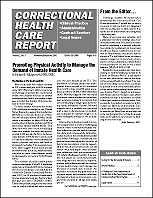Dilemmas with Special Implications in Correctional Health Settings
Author: T. Howard Stone, J.D., LL.M..
Source: Volume 16, Number 03, March/April 2015 , pp.33-40(8)

next article > |return to table of contents
Abstract:
Physicians, nurses, and allied health professionals are held to higher ethical standards than other professions. The ethical issues that face correctional health care professionals, while perhaps not unknown to practitioners on the “outside,” take on special significance, even urgency, when the patient is a social outcast. In this incisive and useful commentary, Howard Stone, who serves on the state of Washington’s Institutional Review Board and has taught bioethics at the University of Texas, addresses these issues in ways that correctional professionals will find practical, reasonable, and helpful. Professor Stone bases his discussion on four fundamental principles that shape the ethical framework for correctional health care providers: respect for patient autonomy; beneficence (i.e., health care is for the patient’s best interests); non-maleficence (i.e., avoiding patient harm); and justice, equality and fairness.Keywords: educational attainment and literacy proficiency; decision making capacity; Cruzan v. Director, Missouri Department of Health, 497 U.S. 261; diminished social support; poor health status; Brown v. Plata; McElligott v. Foley; Harris v. Hegmann et al.;
Affiliations:
1: Washington State Institutional Review Board and Human Protections Administrator.